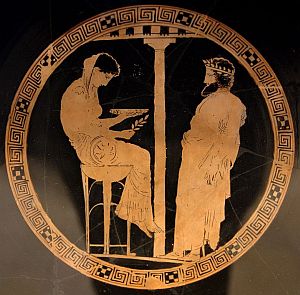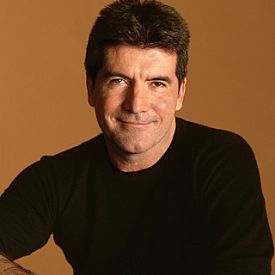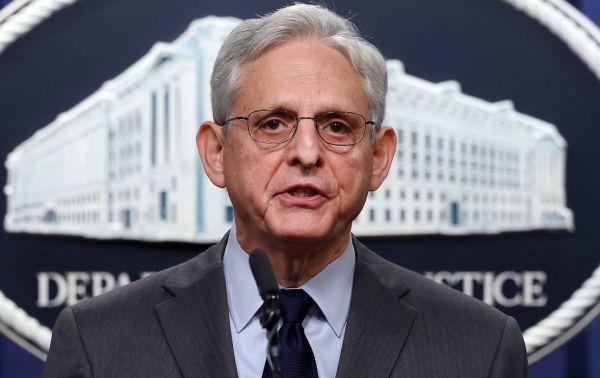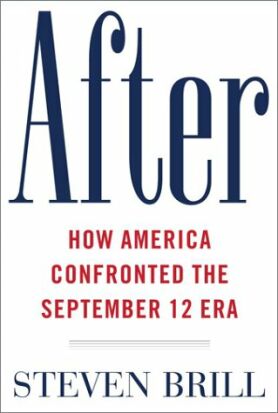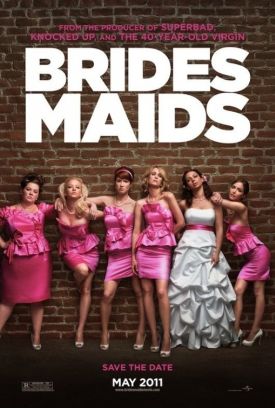Cessation of the Oracles
From The New CriterionThe Oracle (seated) at work with King Aegeus
The pronouncements of the Delphic oracle were delivered by a priestess, appearing to rise (by a cunning mechanical contrivance) amid clouds of incense on her serpent-throne, from a chasm which cleft to the centre of the earth, in a theatrical display calculated to outscore the appeal of the rival oracle of Zeus at Dodona. Her voice was one of the most powerful influences on the history of ancient Greece. . .Yet despite the impressive display, the shrine declined in prestige as it became apparent that the messages of the god were politically calculated or purchased by corruption.
Felipe Fernández-Armesto, Truth, A History and a Guide for the Perplexed
What’s happening to the sooth-sayers of the media in our own day is hardly unprecedented in human history, and nor, I expect, is the media’s own inability to grasp what has befallen them. The ideas of “post-truth” and “fake news” which have been posited as explanations, the subjects of recent essays in this space, are not without merit but are pretty nearly useless for so long as they are regarded only as someone else’s problem. Those of us who are disinclined to take the oracular pronouncements of the media as to what is truth or fact at their own valuation take a somewhat different view of what constitutes fake news and think that they ought to have sufficient self-awareness to take see what we see. But I imagine that once you’ve been an oracle for as long they have, you must have the devil of a time adjusting to non-oracle status, if you ever do.
Which is why, I take it, when the media turn to self-examination as they have done in the wake of the November election, they continue to behave as if their utterances were no less Delphic than ever, even though they have become much more predictable than predictive. Here, for example, is Nicholas Kristof of The New York Times on “Lessons From the Media’s Failures in Its Year With Trump” — which, by the way, gives away in its headline what would have been obvious in any case: namely, that if the election of Mr Trump represented media failure, then the election of Mrs Clinton would have represented the success of the media’s election project.
The last year has not been the news media’s finest (wrote Mr Kristof). Despite some outstanding coverage, over all we misled many people into thinking that Donald Trump would never win the Republican nomination, let alone the White House. Too often we followed what glittered, yapped uselessly at everything in sight and didn’t dig hard enough or hold politicians accountable for lies.
“Politicians”? Well, his audience will know which politician is intended, as also how frequently and with how much ontological certitude he actually was “held accountable” — whatever that may mean — for lies, real or imagined, since there certainly were a great many accounts of them.
I haven’t gone through the media’s election coverage and counted every instance of the words “lie”, “lies”, “lying”, “liar” and their cognates or synonyms, but I’m quite sure that if I did I would find there were many, many more occurrences of these words, the vast majority of them with reference to things said by Mr Trump, than in any election past. You may remember that the vogue for promiscuous accusations of lying came into our politics like a miasma under George W. Bush and the alleged “lies” that took us into war in Iraq. It received a new fillip from Democratic tactics in the election of 2012 (see “Lexicographic Lies” in The New Criterion of October, 2012). But by now the accusation has become almost robotic and accordingly lost whatever force it might once have had.
It can hardly, therefore, be the case that the media were not holding “politicians” accountable for lies in the recent election. Rather, it appears that people in far greater numbers than ever before were willing to believe the politicians over the media purporting to hold them to account, though that obvious inference never occurs to Mr Kristof. To him, the answer to every problem or pseudo-problem is for the media to do more of what they are already doing, since it must be literally unimaginable that they could be doing anything wrong. Such smugness and self-righteousness, which takes for granted its own right to pass authoritative judgment on what is and is not a “lie,” must be why they have declined in prestige and are trusted less than ever before.
Mr Kristof’s New York Times colleague, Jim Rutenberg — who last summer urged his fellow reporters to abandon the façade of impartiality and campaign openly against Mr Trump (see “After the Fact” in The New Criterion of October, 2016) even though they could hardly have been more open about their sympathies than they already were — wrote his own self-dramatizing “Lessons From 2016 for the News Media, as the Ground Shifts.”
Starting a weekly column about the nexus between media, technology, culture and politics in the middle of the 2016 presidential campaign was like parachuting into a hail of machine-gun crossfire. Dense smoke was everywhere as the candidates and their supporters unloaded on one another and, frequently, the news media, which more than occasionally was drawn into the fighting. The territory that was at stake was the realm of the true, and how all sides would define it in the hyperpartisan debate to come under a new president.
As James Taranto observed:
By “the realm of the true,” Rutenberg means the authority to issue pronouncements about what is true — an authority, he seems to believe, that rightly belongs to journalists and the sources they deem trustworthy. Elsewhere in the Dec. 26 column he describes the news media’s role as “to do its part in maintaining a fact-based national debate.” And this supposed authority extends beyond matters of fact to judgments of morality and taste.
This Delphic notion of truth is what Mr Kristof appears to mean by holding politicians (i.e. Donald Trump) “accountable” — as does Susan Glasser of Politico, who undertook her own election post-mortem in a long autobiographical essay for the Brookings Institution called “Covering Politics in a ‘Post-Truth’ America.” She, too, frankly sees Mr Trump’s election as a media failure:
So much terrific reporting and writing and digging over the years and … Trump? What happened to consequences? Reporting that matters? Sunlight, they used to tell us, was the best disinfectant for what ails our politics. But 2016 suggests a different outcome: We’ve achieved a lot more transparency in today’s Washington — without the accountability that was supposed to come with it.
Supposed by whom? Accountable to whom? Obviously not by or to the 63 million people who ignored all that “reporting that matters” and voted for Mr Trump anyway. Both mattering, in this sense (as also in “Black Lives Matter”), and “accountability” are weasel-words — words which mean literally nothing outside some particular context but which are routinely used absolutely to suggest, falsely, that their context doesn’t matter. Pace Derek Parfit, philosophical author of On What Matters who died at the beginning of the year, I remain skeptical that there is anything beneath the moon which can matter absolutely; it can only matter to this or that person or group of people, since its mattering in general could be falsified by any other person or group of people to whom it did not matter. The “Black Lives Matter” slogan itself recognizes this by the implicit suggestion that, to the police, black lives don’t matter but ought to. The eliding of the “ought” and the “is” is a bad habit that the philosophers (and others) have learned from Marx.
In the same way, nothing can be accountable absolutely — that is, in the absence of someone to be accountable to. When the media use the term, of course they mean accountable to them, as the ultimate arbiters of truth and falsehood, right and wrong. The words really amount to a demand for attention, a demand against the public’s skepticism for the media to be taken at their own valuation as the quasi-official custodians not only of truth but also of decency and political right-thinking. Of course, it would sound bad to put it that way, so they just talk about “accountability” in general and rely on vagueness to suggest that it sort of means accountable to everybody — the great American public whom they suppose themselves to serve — but through them, the media, as the people’s true representatives. How much of Mr Trump’s support must have come from public resentment towards that preposterous, if implied, claim!
Ms Glasser also mentions the alleged “$1.9 billion in free media coverage” — I love the precision of the number: not $2 billion but only $1.9 billion — Mr Trump is alleged to have received by March of last year. This is remarkably restrained of her. What about the many more billions in free coverage he must have received by election day? But then, of course, she could hardly have pretended to credit what she calls “a widespread view that television had screwed up by handing Trump the microphone and failing to fact-check him adequately.” It’s difficult to see how they could have fact-checked him any more than they did — a fact she herself acknowledges elsewhere when she writes that, “even fact-checking perhaps the most untruthful candidate of our lifetime didn’t work; the more news outlets did it, the less the facts resonated.”
Well, that’s one way to put it. I myself have no doubt that the relentlessly anti-Trump coverage produced a backlash among that large majority of Americans who say they don’t trust the media, and that this must have made a difference, perhaps even the difference in the election. But when the media allow themselves to entertain the dreadful notion that they might have helped rather than hurt the hated billionaire-cum-politician, they do not proceed to the obvious conclusion that lots and lots of voters were prepared to take Mr Trump’s word over that of the media because they had some reason to be skeptical about what the media were choosing to call “facts.” It’s easier to blame the voters as nuts and conspiracy theorists, or else that bigoted “basket of deplorables” Mrs Clinton saw in them.
At one point Ms Glasser almost seems to draw near to something that, in a dim light, might look like genuine self-criticism when she notes that
too much of Washington journalism in the celebrated good old days was an old boys’ club, and so was politics — they were smug, insular, often narrow-minded, and invariably convinced of their own rightness . . . But this is 2016, and Trump has just been elected president of the United States after a campaign that tested pretty much all of our assumptions about the power of the press. Yes, we are now being accused — and accusing ourselves — of exactly the sort of smug, inside- the-Beltway myopia we thought we were getting rid of with the advent of all these new platforms.
But of course she doesn’t entertain this idea for long.
As editor of Politico throughout this never-to-be-forgotten campaign, I’ve been obsessively looking back over our coverage, too, trying to figure out what we missed along the way to the upset of the century and what we could have done differently. . . But journalistic handwringing aside, I still think reporting about American politics is better in many respects than it’s ever been. I have a different and more existential fear today about the future of independent journalism and its role in our democracy. And you should too. Because the media scandal of 2016 isn’t so much about what reporters failed to tell the American public; it’s about what they did report on, and the fact that it didn’t seem to matter.
In other words, the fault isn’t with the media, nor even with this new “democratization of information” which has shaken them up during the last 20 years. How could it be? The problem must be with everybody else, who didn’t pay the media enough attention, who didn’t agree with the media about what mattered. Not surprisingly, that was also the view of Mr Kristof:
In 2008 (he wrote), the three broadcast networks, in their nightly news programs, devoted over the entire year a total of three hours and 40 minutes to issues reporting (defined as independent coverage of election issues, not arising from candidate statements or debates). In 2016, that plummeted to a grand total of just 36 minutes. ABC and NBC had just nine minutes of issues coverage each; CBS had 18 minutes. So ABC and NBC each had less than one minute of issues coverage per month in 2016. Those figures come from Andrew Tyndall, whose Tyndall Report monitors the news programs. By Tyndall’s measures, there was zero independent coverage in 2016 on those nightly programs about poverty, climate change or drug addiction. “Journalists were confronted with the spectacle of an issues-free campaign,” Tyndall told me.
By “issues” he appears to mean only those issues — “poverty, climate change or drug addiction” — that matter to the left and their media allies and that would matter to us, too, if we took a proper view of the media’s authority in mattering matters. Like Ms Glasser, he simply assumes that telling the rest of us what we ought to be worried about is part of his job. Presumably the issues on which Mr Trump based his appeal — immigration, jobs, terrorism — don’t count as such in Mr Tyndall’s reckoning, though Mr Kristof’s making an exception in the general picture for the media’s investigations into “Trump’s foundation, taxes and past” suggests that those things do. Scandals count as issues too, at least when they are Trump scandals.
That is worth remembering when we look at the Kristof prescription for his fellow scribes during the Trump administration that lies ahead: “Not celebrity, but substance.” As George S. Kaufman said, “Satire is what closes on Saturday night” — and, he might have added, “substance” closes on Saturday afternoon, at least now that the media’s oracular prestige as to what is and isn’t substance is gone with the Delphic incense. The media themselves just don’t know it yet.
Mr Rutenberg buoys himself with hope in the backlash to the backlash, noting that
in the weeks since the election, magazines like The New Yorker, The Atlantic and Vanity Fair; newspapers including The New York Times, The Wall Street Journal, The Los Angeles Times and The Washington Post; and nonprofits like NPR and ProPublica have been reporting big boosts in subscription rates or donations. It’s as if Mr. Trump’s media attacks have combined with the heightened attention on the perils of fake news to create one big fat advertisement for the value of basic journalism.
Meanwhile Mr Kristof looks to more philanthropic subsidies “to finance coverage that is important but unprofitable.” They may both be right, but they don’t explain how any of this is going to make Trump voters start demanding more “fact-checking” to discredit their hero or agree with them about what matters. It sounds to me as if they are whistling past the media graveyard.
Discover more from James Bowman
Subscribe to get the latest posts to your email.

